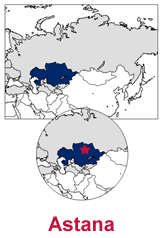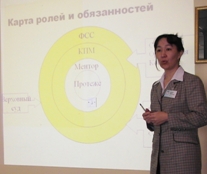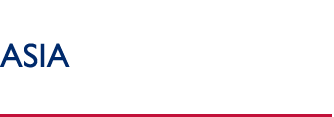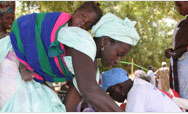 |
|
 |
 |
 |
USAID Information:
External Links:
|
|
 |
 |
|
 |
 |
|
Kazakhstan

SNAPSHOT
Date of independence: 1991
Capital: Astana
Population: 15.3 million (2006)
Income Per Person : $3,870 (yr)
Source: World Bank Development Indicators 2007
USAID IN KAZAKHSTAN
http://centralasia.usaid.gov
CONTACTS
Regional Mission Director
William Frej
USAID/Central Asia
41 Kazibek bi St
Almaty, Kazakhstan 050010
Tel: 7-327-250-79-12
USAID Branch Office - Astana
U.S. Embassy
Ak Bulak 4, Str. 23-22, Building #3
Astana, Kyrgyzstan 010010
Tel: 7-3172-70-21-00
Bob Wallin
Central Asia Team Leader
Tel: 202-712-0141
Email: bowallin@usaid.gov

For Inessa Kuanova, a judge in the North-Kazakhstan Oblast, the USAID judicial mentorship program is a far cry from her memories of the repressive, Soviet-era "apprenticeship" system. Rather than establishing rigid, subservient relationships between senior judges and their new colleagues, the USAID program emphasizes collegial information sharing in preparing mentors to help those just starting out on the bench.
"I returned to work full of new ideas and started to promote this program to our newly appointed and experienced judges," Kuanova, who recently became a mentor herself.
Overview
Kazakhstan is a strategic U.S. partner in Central Asia and an ally in the Global War on Terrorism. It has worked with the United States to confront the terrorist threat in the region and in Iraq, where its military engineers have worked to restore stability for the past several years. Since President Nazarbayev’s 1991 decision to give up the nuclear arsenal inherited from the Soviet Union, Kazakhstan and the United States have worked together to prevent the proliferation of weapons of mass destruction by securing nuclear, chemical, and biological weapons. As Kazakhstan’s oil production increases and its economy grows and stabilizes as the result of sound economic reforms, the country is becoming increasingly influential in the region and on the world stage. The USAID program in Kazakhstan supports economic diversification, primary health care system improvements, and further democratic political reform.
Programs
Economic Growth
Over the past 15 years, USAID has helped Kazakhstan carry out privatization and pension reform, strengthen the banking sector, and create legislation that supports the market economy. The mortgage system, introduced with USAID support, is successfully dealing with the global financial crisis, while international accounting standards are being adopted by companies as a result of a sustainable accounting certification program that has already certified over 4,000 accountants in the country. USAID also continues to support Kazakhstan’s accession to the World Trade Organization; works on reducing trade barriers relating to transport, transit, border crossing, and customs clearance; and helps to increase the access of businesses to market information.
The energy program works to establish a transparent, competitive energy market; increase electricity trade; and introduce market-based solutions to current disputes on hydroelectricity facilities and reservoirs. A business environment improvement project helps to reduce regulatory and administrative constraints for small and medium enterprises. Most recently, this project produced $140 million in annual savings for businesses through improved business licensing and government procurement laws. Assistance to the microfinance sector included the founding of KazMicroFinance, which was declared one of the world’s 50 best microfinance institutions in 2006 by Forbes magazine. KazMicroFinance now disburses $8 million in loans to 4,000 clients a month.
Since 2006, USAID’s work in the economic growth sector has been co-funded by the Government of Kazakhstan under the joint Program for Economic Development. A key objective of the program is to help Kazakhstan become one of the world’s 50 most competitive countries. curricula.
Investing in People: Quality Health Care
USAID’s quality primary health care program is helping Kazakhstan to reform its health system and ensure utilization of quality primary health care services. Assistance focuses on improving the maternal, child, and reproductive health services and supports the implementation of the World Health Organization–recommended live birth definition. USAID has helped over 16,000 women prepare for safer births, has reached over 1.5 million people with improved child care information, and has piloted the introduction of the live birth definition to reduce maternal and child mortality. USAID also helps the country combat avian influenza and control infectious diseases like HIV/AIDS and tuberculosis (TB), including efforts to reduce the spread of multi-drug-resistant TB. These efforts have helped to reduce TB rates from 167 per 100,000 population in 2000 to 136 per 100,000 population, saving over 22,000 lives.
Governing Justly and Democratically
With USAID support, Kazakhstan has developed a robust network of nongovernmental organizations over the past 15 years that are able to provide se Qrvices and advocacy in various areas. The media sector has expanded from 10 national newspapers and 21 television and radio stations in 1990 to over 2,000 outlets. USAID's programs continue to facilitate the development of a democratic culture through support for civil society, independent media, the development of political parties, and the protection of human rights. To improve judicial capacity, USAID helped build a judicial mentorship program and piloted the use of video systems to record court proceedings. The latter measure is now being replicated countrywide in cooperation with the Supreme Court of Kazakhstan. USAID also provides practical training opportunities in the United States for Kazakhstan’s business and professional organizations, while small grants, disbursed through the Eurasia Foundation, help strengthen private enterprise, civil society, public administration, and education.
Back to Top ^
|


